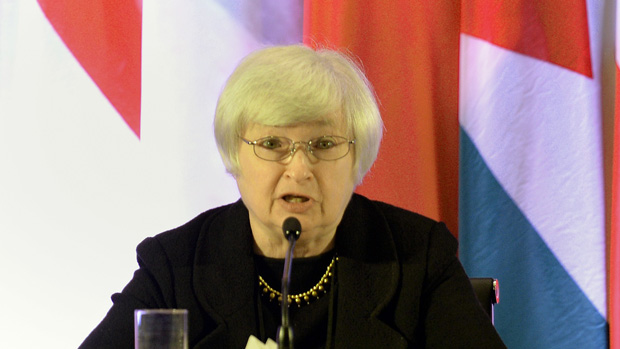Janet Yellen: what you need to know about the new Fed chief
Five things you might not know about Janet Yellen, the woman appointed to run the Federal Reserve

A free daily email with the biggest news stories of the day – and the best features from TheWeek.com
You are now subscribed
Your newsletter sign-up was successful
JANET YELLEN was confirmed yesterday by the US Senate as head of the Federal Reserve by a comfortable margin of 56-26. When she takes over from Ben Bernanke on 1 February she will become the first woman to lead the institution in its 100-year history. So what do we know about her?
A 'star pupil' Born in 1946, in Brooklyn, New York, Yellen was a 'star pupil' at high school. She later graduated summa cum laude (with highest honours) after studying economics at Brown University, and followed that with a PhD in economics from Yale. Her first job was an assistant professor role at Harvard in the early 1970s, where she taught Larry Summers, who was also among the front-runners to succeed Bernanke as head of the Fed before he withdrew from the race last month. Yellen, a liberal economist, has since taught at the London School of Economics and the University of California. She has served as president and chief executive officer of the Federal Reserve Bank of San Francisco and as chair of the White House Council of Economic Advisers under President Bill Clinton.
Accurate forecasterIn contrast to a number of her colleagues, Yellen foresaw the dangers of the housing bubble and economic crisis from which the world is still recovering. The danger posed by the housing market is the "600-pound gorilla in the room", she told Fed colleagues in June 2007. Yellen, who has served as the vice-chair of the Federal Reserve for the last three years, has also produced the most accurate forecasts of all the current Fed officials since 2009, according to the Wall Street Journal.
The Week
Escape your echo chamber. Get the facts behind the news, plus analysis from multiple perspectives.

Sign up for The Week's Free Newsletters
From our morning news briefing to a weekly Good News Newsletter, get the best of The Week delivered directly to your inbox.
From our morning news briefing to a weekly Good News Newsletter, get the best of The Week delivered directly to your inbox.
'Quake-proof' calmYellen has been praised for staying calm during a crisis. In fact, she was working in her sixth-floor office as a professor at the University of California when the deadly Loma Prieta earthquake struck San Francisco in October 1989. Rather than reacting with alarm, she reportedly remained at her desk until she was urged by her colleague, Andrew Rose, to join him under a door frame where they would be safer. "I was sure the building was going to collapse and I was going to die," Rose told Bloomberg. "But she was quite calm right through the earthquake. I don't think she said a thing."
A 'hawk in dove's clothing' Central bankers are often described as "hawks" who prioritise inflation or "doves" who focus on unemployment. Yellen is seen as dove-like for wanting to stimulate the economy back to full employment. In 1986 she wrote a paper with her husband, George Akerlof, a Nobel Prize-winning economist, arguing that lower wages can lead to higher, not lower, unemployment. However, economist Evan Soltas has called her a "hawk in dove's clothing" because she pushed hard for interest rate rises in 1996 to choke inflation, and may do so again when the moment comes.
'Thoughtful and compassionate' economistJeff Madrick, a senior fellow at the Roosevelt Institute, describes Yellen as a mainstream economist, but a "thoughtful and compassionate" one. "She is the kind of economist America badly needs," he says, "one who cares about wages and employment at least as much as about appeasing bond traders". According to The Times, when Yellen first joined the Federal Reserve board of governors in 1994, she "shocked the crusty Fed establishment" by eating in the staff canteen, explaining that it was "a pretty good way to learn what people are thinking about".
A free daily email with the biggest news stories of the day – and the best features from TheWeek.com
-
 The ‘ravenous’ demand for Cornish minerals
The ‘ravenous’ demand for Cornish mineralsUnder the Radar Growing need for critical minerals to power tech has intensified ‘appetite’ for lithium, which could be a ‘huge boon’ for local economy
-
 Why are election experts taking Trump’s midterm threats seriously?
Why are election experts taking Trump’s midterm threats seriously?IN THE SPOTLIGHT As the president muses about polling place deployments and a centralized electoral system aimed at one-party control, lawmakers are taking this administration at its word
-
 ‘Restaurateurs have become millionaires’
‘Restaurateurs have become millionaires’Instant Opinion Opinion, comment and editorials of the day